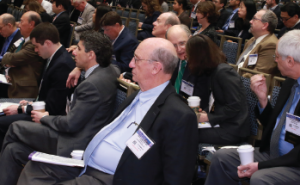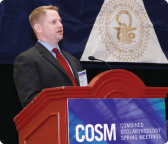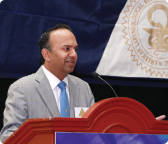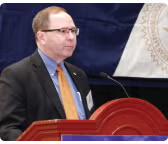
Attendees listen to a panel at the Triological Society annual meeting.
NATIONAL HARBOR, Md.—Washington may not see eye to eye on much these days, but the otolaryngologists and other healthcare professionals at the 2018 Triological Society Annual Meeting held in conjunction with the Combined Otolaryngology Spring Meetings (COSM) in this D.C. suburb agreed that the meeting was well worth their time.
Explore This Issue
June 2018COSM drew 2,700 registrants to National Harbor, Md., during the five-day meeting in April. Nearly 900 residents and medical students attended, many who were afforded the opportunity to present clinical and research papers and posters at the society meetings. During the Triological Society’s scientific sessions, 65 podium presentations were given and 125 posters were presented. Numerous panel discussions were held on everything from treating Eustachian tubes to patenting good ideas—all to further attendee education.
“One, you really get exposure to all of the different projects, the breadth and depth of what is going on in the community,” said third-year otolaryngology resident Mallory Raymond, MD, of Emory University in Atlanta. “And then it’s a good networking opportunity for you to meet people in the fields you’re interested in … it’s nerding out together.”
“Being able to see old friends, make new friends, mentor trainees, and continue to contribute scientifically is a key part of this,” added Jose Zevallos, MD, MPH, an otolaryngologist at Siteman Cancer Center at Washington University School of Medicine in St. Louis. “Every time you come, it inspires you to do better. It inspires your science, it inspires your clinical work, and it drives you forward.”
In discussing the options of treatment, you must appear confident without appearing arrogant. This is a very fine and difficult line to follow. The patient has to have full faith and confidence that you are the one who they can trust with their life. —Mark Persky, MD, president of the Triological Society
Presidential Address: Earning Patient Trust
The trust in the meeting’s value echoed the themes of the presidential address from Triological Society President Mark Persky, MD. His talk focused on whether patient trust is entitled or earned.
“The answer is, it must be earned,” he said. “Is there a simplified formula for earning the patient’s trust? The answer: Do unto others as you would have them do unto you. Put yourself in the patient’s position … sounds simple, but it’s not so easy.”
Dr. Persky said he engages his patients without a computer to be more personal, even though it means he must later spend additional time completing his electronic health records. During office hours, he apologizes if he is late to the appointment, and he asks over and over if the patient has questions.
But where he draws the line is asking patients their preferred treatment option without offering his advice concerning his preferred treatment options. “There can be many options of therapy,” Dr. Persky said. “But here is where the art of being a physician enters … certainly a patient has the final decision, but I do not present the options and then ask him or her to make a choice. The patient is there for my expertise, and after discussing the options, I present them my preference for therapy.”
Dr. Persky added that another skill of a good physician is delivering that recommendation the right way after considering each patient’s unique situation and problems, which ultimately engenders even more trust.
“In discussing the options of treatment, you must appear confident without appearing arrogant. This is a very fine and difficult line to follow,” he said. “The patient has to have full faith and confidence that you are the one whom they can trust with their life.”
Triological Society New Fellow Thesis Award Winners
Three new fellows presented their award-winning theses at the Triological Society’s 2018 121st Annual Meeting.
Harris P. Mosher Award for Clinical Research
 How Does Aging Affect Recognition of Spectrally Degraded Speech? —Aaron Moberly, MD, The Ohio State Universty Wexner Medical Center, Columbus.
How Does Aging Affect Recognition of Spectrally Degraded Speech? —Aaron Moberly, MD, The Ohio State Universty Wexner Medical Center, Columbus.
Dr. Moberly looked at what factors impact speech recognition for patients with cochlear implants (CI). In his medical school and residency training, he did work on CIs and speech development in children, but his interest gravitated toward an older population.
“We see enormous variability in terms of speech recognition outcomes for patients with implants, and we don’t have a good understanding of what underlies that,” Dr. Moberly said. “It’s apparent, though, that aging leads to declines in the ability to understand degraded speech, and it looks like that occurs through both changes in auditory processing and higher level cognitive changes that occur with aging.”
The cross-sectional study supported the hypothesis that “the detrimental effects of advancing age on speech recognition can be attributed both to declines in auditory spectral resolution as well as declines in cognitive functions.” Both adult CI users and patients with normal hearing were assessed for speech recognition using sentences and words. For those with normal hearing, speech was spectrally degraded using noise-vocoding. Cognitive skills were also assessed using nonauditory visual measures, including working memory and perceptual closure.
“Teasing apart auditory processing and cognitive processing can be very challenging,” Dr. Moberly said. “That’s one of the things that I really wanted to include.”
The next step for his research is to work on better assessment batteries and focused post-operative aural rehabilitation (AR), Dr. Moberly added.
“By understanding (these issues) better, we should be able to develop better interventions,” he said. If “someone has very poor auditory processing, maybe you could train them in some fashion to get better, versus someone who has cognitive declines or cognitive changes that are impacting their outcomes.”
Edmund Prince Fowler Award for Basic Research
 Disruption of Sinonasal Epithelia Nrf2 Enhances Susceptibility to Rhinosinusitis in a Mouse Model —Murray Ramanathan, Jr., MD, associate professor for the departments of otolaryngology–head and neck surgery and neurosurgery at Johns Hopkins School of Medicine in Baltimore.
Disruption of Sinonasal Epithelia Nrf2 Enhances Susceptibility to Rhinosinusitis in a Mouse Model —Murray Ramanathan, Jr., MD, associate professor for the departments of otolaryngology–head and neck surgery and neurosurgery at Johns Hopkins School of Medicine in Baltimore.
Dr. Ramanathan was interested in rhinology because he had sinus and allergy problems growing up. He became interested in the Nrf2 transcription factor that helps regulate multiple antioxidant genes after working with a leading expert at Johns Hopkins Bloomberg School of Public Health, Shyam Biswal, PhD. Blend those two together and his thesis choice makes a whole lot of sense. “People have looked at (Nrf2) in asthma and the lungs, but no one has looked at it in the nose,” Dr. Ramanathan said. “As a rhinologist, I care about the nose. It’s bringing my clinical interests [together] with (Dr. Biswal’s). Together, it’s a partnership, and it’s great because it’s a frustrating disease to treat. There are not a whole lot of options out there.”
The most common treatments, of course, are steroids and surgery. But Dr. Ramanathan’s research demonstrated enhanced severity of eosinophilic sinonasal inflammation from disruption of the epithelial-specific Nrf2 pathway. The mice also exhibited increased goblet cell hyperplasia and sinonasal epithelial thickening, as well as elevated mucosal IL-13 levels, findings similar to those seen in chronic rhinosinusitis patients.
Future research will continue testing the mice model and progress to clinical trials as quickly as possible. “The antioxidant system does play a role in sinusitis and chronic sinusitis, and it does provide a nonsteroidal avenue for possible therapies,” Dr. Ramanathan said, adding that this is important because steroids are associated with so many side effects.
Another reason for excitement, he added, is that there are already multiple “existing and emerging FDA-approved Nrf2 activating drugs that can be repurposed.”
“You don’t need to create a drug,” Dr. Ramanathan said. “You just need to study the efficacy and to make sure there are no side effects for using it for different purposes.”
Maureen Hannley Award for Alternative Science
 Comprehensive Look at Chronic Sinusitis Using a Claims Database —James Denneny III, MD, executive vice president and CEO of the American Academy of Otolaryngology–Head and Neck Surgery
Comprehensive Look at Chronic Sinusitis Using a Claims Database —James Denneny III, MD, executive vice president and CEO of the American Academy of Otolaryngology–Head and Neck Surgery
Dr. Denneny’s work confirms the previously described “value proposition” that compared surgical management of chronic rhinosinusitis (CRS) to medical management. And it does so with the most comprehensive data dive yet, culling figures and metrics from 160 million patient years reported to Medicare and Truven Health MarketScan.
“The main picture would be that it’s a broad-based disease affecting all groups, all sexes, all regions of the country,” Dr. Denneny said. “And there is an established medical paradigm for managing it and diagnosing it that works. When (patients) fail that, then the surgical procedures —endoscopic sinus surgery, and we’ve got some early balloon data—are beneficial both from a patient outcomes perspective and from a cost perspective.”
Having empiric figures also helps otolaryngologists when they talk with some insurance companies, Dr. Denneny said. Otolaryngologists can now report that the mean yearly cost of CRS was $958 in the commercial insurance population and $741 in the Medicare population, and they can point out that comorbidities exited in 56.9% of patients with CRS (led by allergic rhinitis, headache, and asthma).
The data is even more helpful when it comes to confirming the appropriate use of debridement and nasal endoscopy by otolaryngologists. “We’re told by the insurance companies that people are debriding eight or 10 times,” he added. “The average is 1.78, and that’s for an entire post-op period of seven-and-a-half months of healing, which is a generous amount of time. That is extremely powerful, and the same with nasal endoscopy, which is only 1.76.”
Otolaryngologists are “reasonably treating” these cases, Dr. Denneny said. “They’re not doing procedures that aren’t necessary on these patients. And that’s a big message to the public.”
Richard Quinn is a freelance medical writer based in New Jersey.
Words of Wisdom
The three thesis honorees give their advice on how to arrive at an award-worthy Triological Society thesis.
Dr. Moberly: “Find a topic you’re really interested in or something you are already working on and build on that. It will make the thesis much more meaningful and impactful.”
Dr. Ramanathan: “Get lots of help from other people. Have other people read your thesis. Talk to your colleagues to see if it’s something that they’re interested in generally. It’s good to tackle a problem that other people are aware of.”
Dr. Denneny: “I’m one of the oldest people that’s ever put one through. So it is never too late. … If it’s something you’re really interested in, it’s absolutely worth doing. I learned a lot doing it, and it will produce value.”